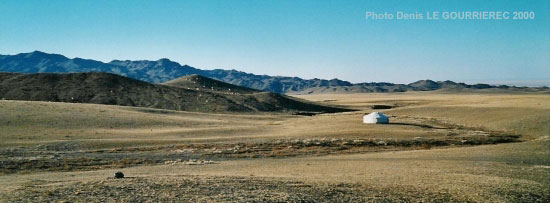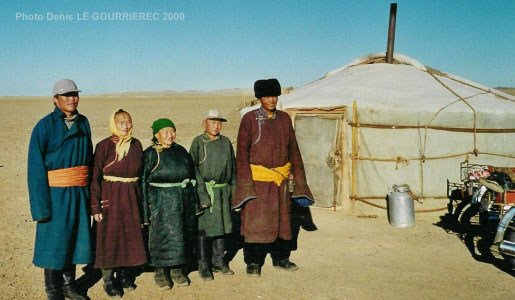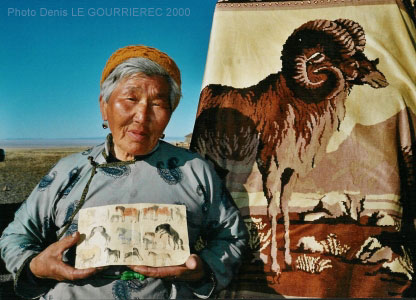|
Mongolia was the first asian
and buddhist land I visited. It was the first very different country,
and at the end of this trip, it remains unlike any other thanks its
unique way of life and traditions, and its history. I met 4 other travellers
in Ulan-Bator, and we arranged our trip via our guesthouse. Peg, from
the U.S. was teaching english in Mongolia and had learn some mongolian,
Tim from England, Roger and Fatima from Sweden were travelling just
like me. For a week, we bounced around in a 4x4 van across the steppe
and the desert, led by our funny mongolian driver. Every evening, he
would found in the middle of nowhere a "ger" (see note 1), the round tents you can see
everywhere in Mongolia, where there are people that is. For a week,
the nomads offered us their unforgetable hospitality and an unequalled
insight into their way of life and their traditions, so alive and so
fascinating. Mongolia remains one of the places I loved the most in
the whole trip. Here is why...
When we arrived at a ger at dusk, we offered a few
simple gifts. Like in many asian countries, offering and receiving something
with both hands is a sign of respect. The left hand, considered impure,
should never be used in such situations and especially not to eat. Thus,
our small gifts (a bottle of "arkhi", mongolian vodka, a bar
of soap, a lipstick, a pen and a notebook, and a postcard) were offered
to our host or to the eldest person. The gifts were redistributed to
the members of the family : the vodka (always shared with us later on)
was left within easy reach, the lady received the bar of soap and the
lipstick (which she would wear next morning when we took some photographs),
and the kids were happy to start scribbling with the pen on the notebook.
The postcard, a view typical from Mongolia, nothing unknown to them,
nevertheless captured the attention of the whole family. It was then
placed carefully on a frame, on the only one piece of furniture at the
back of the ger, along with photos and other postcards.We regretted
not having photographs or postcards from our respective countries to
show them.

While the tea was being prepared, we played dice or
card games with our host and the kids, who were quick to learn the rules
and eager to play. They also taught us a game with knuckle bones. Mongolian
tea is not your usual cuppa. A handful of small twigs (rather than leaves)
are boiled for a while in much water, then a laddle of milk (from cow,
camel or goat) is added along with a pinch of salt (it's not so bad).
The only one stove is dung fired (no wood around here) and cooking followed,
inevitably mutton and rice, mutton and noodle, sometimes potatoes with
mutton (fatty chunks rather than meat, as a sign of honour for us, boiled
and served as a soup). Toasting with vodka was soon a well practice
procedure. Bottles with capsules, once open, must be finished. Only
one glass passes around. First, the host or the eldest person dips the
right hand third finger in the glass, and throws a few drops in the
air, "to the sky", a few to the ground, "to the earth",
and a few towards the rest of us, "to the people". He or she
the downs the vodka. The host fills the glass again and then passes
it to each of us in turn, offering with the right hand, the left hand
under the right elbow, and we receive the same way. It is impolite to
refuse in Mongolia. When Roger proposed a cigarette to our host who
did not smoke, he took one out of the pack, and then with a smile and
a wave of the hand, put it back in. He did not refuse. We were offered
once a bowl of "airag" (fermented mare's milk, a slightly
alcoholic, slightly fizzy but very bitter product) from which each we
took just a sip, leaving the son of our host to down the rest.
I was in Mongolia at the
beginning of October. The Gobi (see note 2) was
still quite mild during the day but the steppe further north was already
getting seriously cold, covered by a layer of snow 5 - 10 cm thick in
some places. The ger, heated by the stove, was pleasant, but outside
it was probably down to -10 deg after dusk. This did not stop the wife
of our host to step outside in a T-shirt to pick up some dung for the
fire. The ger being round, with the stove in the middle and sometimes
two beds on either side near the wall, we had to work out which layout
was best to fit the 6 of us (including the driver).This space is normally
occupied by 4 or 5 members of the family. We lied down on the ground
on thick sheep skins, wrapped in our sleeping bags and covered with
more sheep skins by our considerate driver. Indeed, the fire was not
always kept going all night.
In the morning, breakfast (see dinner for the menu)
was prepared by the wife of our host, while our driver was busy heating
up the engine of the van with his scary kerosene blow-torch (also used
to cook lunch on the road). We washed our faces rapidly in the freezing
morning air with ice cold water.  Toilets were about 50 m away in any
direction, behind a few taller blades of grass (sometimes there was
a hole in the ground, surrounded by a few planks to hide it a little).
As
we started our breakfast, the van accepted to start and our driver joined
us with a triumphal smile on his face. We never left before taking some
pictures, our hosts always proud to pose for us and with us in front
of their ger, on their motorbike or on their horse. I have never seen
people so happy to have photos taken. It will be difficult for reprints
to reach them, but it is worth a try, since they will be so happy to
receive some pictures. Then we were ready to set off. Toilets were about 50 m away in any
direction, behind a few taller blades of grass (sometimes there was
a hole in the ground, surrounded by a few planks to hide it a little).
As
we started our breakfast, the van accepted to start and our driver joined
us with a triumphal smile on his face. We never left before taking some
pictures, our hosts always proud to pose for us and with us in front
of their ger, on their motorbike or on their horse. I have never seen
people so happy to have photos taken. It will be difficult for reprints
to reach them, but it is worth a try, since they will be so happy to
receive some pictures. Then we were ready to set off.
One of our stops was a little different. The lady
was living with her grand-son only, as the rest of the family was away
with the cattle (see note 3). Instead
of a ger, she was living in a small hut, with ... a solar panel on the
roof, a battery, therefore electricity and even a small TV set. In the
morning, she asked us to take some photos of a painting with horses
done by her late father. The colours were fading with time and she wanted
a copy. As we were leaving, we caught through the fogged up windows
of our van, a traditional and most beautiful gesture from her, as she
threw a laddle of milk in our direction, as a sign of blessing.

see more photos from Mongolia
__________________________________________________________
Note 1 : Pronounce "gair". The word "yurt" was
introduced by the russians and is not used by the Mongols, but by the
Kirghiz and the Kazakhs.
Note 2 : The Gobi is not a sand desert as often pictured,
but rather a vast and arid yet diverse expanse. The landscape sometimes
seems endlessly dead flat and the ground is covered in small dark pebbles
or dotted with with small dry shrubs, then a few hours further it becomes
more hilly or mountainous. In the south a huge sand dune (800 high,
100 km long, 20 km wide) stretches to the horizon. But I only saw a
fraction of this immensity...
Note 3 : The steppe can accomodate cows, horses, sheeps and
goats. The Gobi, being more arid, is more suitable for camel, sheep
and goats. Yaks are also reared in more mountainous areas. Cattle is
protected from wildlife by huge and agressive dogs which sometimes chased
our van as we drove past a ger or a herd.
|

 Toilets were about 50 m away in any
direction, behind a few taller blades of grass (sometimes there was
a hole in the ground, surrounded by a few planks to hide it a little).
As
we started our breakfast, the van accepted to start and our driver joined
us with a triumphal smile on his face. We never left before taking some
pictures, our hosts always proud to pose for us and with us in front
of their ger, on their motorbike or on their horse. I have never seen
people so happy to have photos taken. It will be difficult for reprints
to reach them, but it is worth a try, since they will be so happy to
receive some pictures. Then we were ready to set off.
Toilets were about 50 m away in any
direction, behind a few taller blades of grass (sometimes there was
a hole in the ground, surrounded by a few planks to hide it a little).
As
we started our breakfast, the van accepted to start and our driver joined
us with a triumphal smile on his face. We never left before taking some
pictures, our hosts always proud to pose for us and with us in front
of their ger, on their motorbike or on their horse. I have never seen
people so happy to have photos taken. It will be difficult for reprints
to reach them, but it is worth a try, since they will be so happy to
receive some pictures. Then we were ready to set off.







